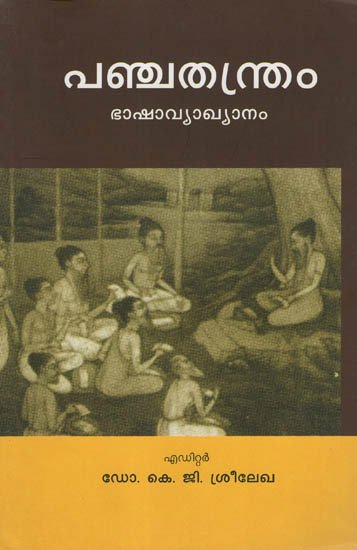Panchatantra [sanskrit]
by Dr. Naveen Kumar Jha | 2016 | 13,828 words | ISBN-13: 9788193077962
The Sanskrit edition of the Panchatantra referencing the English translation and grammatical analysis. Written by Vishnu Sharma and possibly dating as early as 1200 BCE, the Panchatantra (or Pancatantra) represents a collection of short stories teaching basic ethical values and moral conduct that was commonly practiced in ancient Indian. Alternative titles: Śrīviṣṇuśarman Pañcatantra (श्रीविष्णुशर्मन् पञ्चतन्त्र, Śrī-viṣṇuśarman pancatantra, श्री-विष्णुशर्मन्, Sri-visnusarman)
Verse 2.187
असम्पत्तौ परो लाभो गुह्यस्य कथनं तथा ।
आपद्-विमोक्षणं चैव मित्रस्यैतत् फल-त्रयम् ॥ १८७ ॥
asampattau paro lābho guhyasya kathanaṃ tathā |
āpad-vimokṣaṇaṃ caiva mitrasyaitat phala-trayam || 187 ||
The English translation of Panchatantra Verse 2.187 is contained in the book The Complete Pancatantra: Sanskrit Text with English Translation by Dr. Naveen Kumar Jha. This book is not available online so in order to read the full text and translation you should buy the book:
Buy now! English translation by Dr. Naveen Kumar Jha (2016)
Glossary of Sanskrit terms
Note: This extracts Sanskrit terms and links to English definitions from the glossary, based on an experimental segmentation of verse (2.187). Some terms could be superfluous while some might not be mentioned. Click on the word to show English definitions.
Asampatti, Parah, Para, Labha, Guhya, Kathana, Tatha, Apad, Vimokshana, Mitra, Etad, Phala, Traya,
Analysis of Sanskrit grammar
Note: this is an experimental feature and only shows the first possible analysis of the Sanskrit text (Panchatantra Verse 2.187). If the system was successful in segmenting the sentence, you will see of which words it is made up of, generally consisting of Nouns, Pronouns, Verbs, Participles and Indeclinables. Click on the link to show all possible derivations of the word.
- Line 1: “asampattau paro lābho guhyasya kathanaṃ tathā ”
- asampattau -
-
asampatti (noun, feminine)[locative single]
- paro* -
-
paraḥ (indeclinable)[indeclinable]para (noun, masculine)[nominative single]
- lābho* -
-
lābha (noun, masculine)[nominative single]
- guhyasya -
-
guhya (noun, masculine)[genitive single]guhya (noun, neuter)[genitive single]√guh -> guhya (participle, masculine)[genitive single from √guh class 1 verb]√guh -> guhya (participle, neuter)[genitive single from √guh class 1 verb]
- kathanam -
-
kathana (noun, masculine)[adverb], [accusative single]kathana (noun, neuter)[adverb], [nominative single], [accusative single]kathanā (noun, feminine)[adverb]
- tathā -
-
tathā (indeclinable correlative)[indeclinable correlative]tathā (indeclinable)[indeclinable]tathā (noun, feminine)[nominative single]
- Line 2: “āpad-vimokṣaṇaṃ caiva mitrasyaitat phala-trayam ”
- āpad -
-
āpad (noun, feminine)[compound], [adverb], [nominative single], [vocative single]√āp (verb class 5)[aorist active third single]
- vimokṣaṇam -
-
vimokṣaṇa (noun, masculine)[adverb], [accusative single]vimokṣaṇa (noun, neuter)[adverb], [nominative single], [accusative single]vimokṣaṇā (noun, feminine)[adverb]
- cai -
-
ca (indeclinable conjunction)[indeclinable conjunction]ca (noun, masculine)[compound], [vocative single]ca (noun, neuter)[compound], [vocative single]cā (noun, feminine)[nominative single]
- aiva -
-
√i (verb class 2)[imperfect active first dual]
- mitrasyai -
-
mitra (noun, masculine)[genitive single]mitra (noun, neuter)[genitive single]
- etat -
-
etad (noun, masculine)[compound], [adverb], [nominative single], [vocative single]etad (noun, neuter)[compound], [nominative single], [accusative single]
- phala -
-
phala (noun, masculine)[compound], [vocative single]phala (noun, neuter)[compound], [vocative single]√phal (verb class 1)[imperative active second single]
- trayam -
-
traya (noun, masculine)[adverb], [accusative single]traya (noun, neuter)[adverb], [nominative single], [accusative single]
Other editions:
Also see the following editions of the Sanskrit text or (alternative) English translations of the Panchatantra Verse 2.187
Pancatantra of Visnusarman
by M. R. Kale (2015)
Panchatantra in Simple Sanskrit
by Dr. Vishwas (2016)
Panchatantram (Telugu)
by Tadanki Venkata Lakshmi Narasimha Rao (2020)
Published by J. P. Publications, Vijayawada; Throughout black & white Illustrations; 9788192053851.
Buy now!Preview of verse 2.187 in Telugu sript:
అసమ్పత్తౌ పరో లాభో గుహ్యస్య కథనం తథా ।
ఆపద్-విమోక్షణం చైవ మిత్రస్యైతత్ ఫల-త్రయమ్ ॥ ౧౮౭ ॥
Panchatantram Bhashavyakhyanam (Malayalam)
by Dr. K.G. Sreelekha (2010)
Published by the University of Kerala.
Buy now!Preview of verse 2.187 in Malayalam sript:
അസമ്പത്തൌ പരോ ലാഭോ ഗുഹ്യസ്യ കഥനം തഥാ ।
ആപദ്-വിമോക്ഷണം ചൈവ മിത്രസ്യൈതത് ഫല-ത്രയമ് ॥ ൧൮൭ ॥
The Panchatantra Stories (Tamil)
by P. S. Aacharya (2017)
Published by Narmadha Pathippagam, Chennai.
Buy now!
Panchatantrer Galpa (Bengali)
by Children's Book Trust (2014)
Throughout color Illustration; 9788170112730
Buy now!Preview of verse 2.187 in Bengali sript:
অসম্পত্তৌ পরো লাভো গুহ্যস্য কথনং তথা ।
আপদ্-বিমোক্ষণং চৈব মিত্রস্যৈতত্ ফল-ত্রযম্ ॥ ১৮৭ ॥
Panchatantra in Gujarati (Comic)
by Anant Pai (2013)
[શિયાળા અને રણશિંગ પંચતંત્ર] Published by Amar Chitra Katha; Throughout Color Illustrations; 9789350853115
Buy now!Preview of verse 2.187 in Gujarati sript:
અસમ્પત્તૌ પરો લાભો ગુહ્યસ્ય કથનં તથા ।
આપદ્-વિમોક્ષણં ચૈવ મિત્રસ્યૈતત્ ફલ-ત્રયમ્ ॥ ૧૮૭ ॥
![Panchatantra [sanskrit] - book cover](/uploads/a/Pancatantra.jpg)






